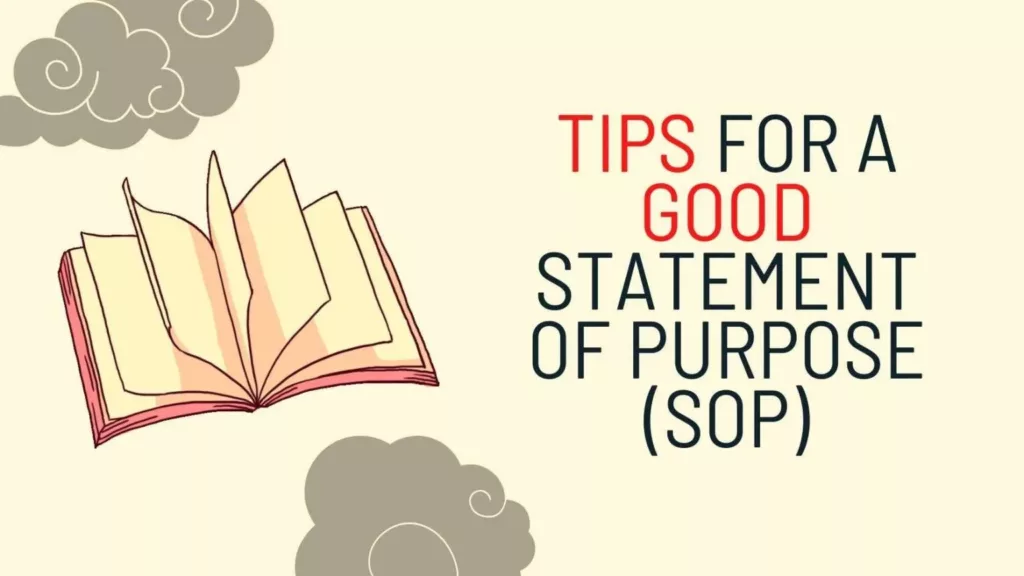Writing a good Statement of Purpose (SoP) requires time, effort, and some tips.
Step 1: Start your SoP Early
Give yourself enough time to draft an effective SOP, as it requires multiple revisions, and not everyone is good at writing compelling write-ups the first time.
Step 2: Don’t just tell them – show them
Don’t just mention what you’ve done in the past; let them know what you learned from those past experiences and how these experiences have shaped you into a better person – personally and professionally. Similarly, don’t just state that you are hard-working, motivated, mentally strong, etc. Give examples that show that you have these qualities. Show by example; you are just part of a pool of applicants where each person is motivated, hard-working, and strong. Put yourself in the position of a judge. Why should you believe that a candidate is strong and motivated?
Step 3: Do proper research
Before you write an SOP, collect relevant information about the school/program you are applying to. Highlight features of your intended program/school that fascinate you, such as research facilities, teaching quality, funding opportunities, work environment, job opportunities, etc.
If your research interests match a professor’s research work, mention it and correlate your work with that of the professor. Use the University’s website and individual professors’ web pages to collect this information.
You can also email the graduate school and ask them for any necessary information. You must clearly understand the expectations of the admission committee and faculty members.
Step 4: Follow the directions
Graduate schools generally mention specific directions about the length of an SOP. You must follow these instructions and keep the SOP to the specified word limit.
If no direction is given, keep your SOP to 1-2 pages; the length of your SOP, in this case, should be such that whatever you have written could not be noted in less amount space more effectively. If some specific questions are asked, try to focus on those questions more in your SOP.
Step 5: Write a specific SoP for each school
Do not use the same generic SOP if you are applying to multiple schools. Tailor your SOP as per the requirements of each school.
Step 6: Stay positive, optimistic, and humble
While writing a good SOP, your tone should represent you as an optimist rather than a pessimist. Choose your words wisely because they reflect your motivation for a graduate degree and your willingness to take on challenging roles during your study. Even if you are talking about your failures, show them how you, as someone, have learned from your mistakes; show them you are not easily demotivated by failures or challenges. Please note that a thin line exists between being confident and being over-confident. Your essay should project you as a secure and aspiring young person, but it should not give a slight hint of arrogance or self-conceit.
Step 7: Be realistic, not Idealistic
Never brag about your potential or future goals. Never make statements like, “I will introduce revolutionary ideas which will change the course of history” or, “My research work will completely eradicate a global problem.” Instead, make statements like, “I will try my best to contribute to the research efforts in my area of interest;” however, you can wish to play your role in eradicating global problems and may wish to become a fellow of prestigious societies in the future.
Step 8: Avoid Clichés
Never use vague, meaningless, and overly used words and phrases. The best example of an overly used and meaningless sentence is, “Since my childhood, I wanted to become a doctor or an engineer or a Ph.D.” Moreover, even avoid reading such example SOPs as soon as you encounter such words; you need to be unique, you need to be a blossoming flower in an arid land, and you need to be a glimmer of hope in the receding skies.
Step 9: Keep Improving
Keep improving your SOP constantly, from the initial rough draft to the final submission. For this purpose, ask your teachers, friends, and family members to read and critically analyze your SOP. If you have time, give yourself a break and then re-read your SOP again.
This will help you in pointing out mistakes that went unnoticed earlier. Print your SOP on the page and revise it as a speech in front of the admission committee instead of reading it on your computer for better proofreading. Listen to your SOP by considering yourself to the admission committee and the faculty members you wish to work with.
Look at your transcripts, GRE, TOEFL/IELTS, work experiences, and SOP, and judge if you will give yourself admission and funding in that particular school. You must also consider the grounds for not providing access or funding.
While judging yourself, keep the application and SOP instructions, the interaction with the program coordinator, the program reputation, and profiles of past successful candidates in your mind (see program website, student Google sites, LinkedIn, US News statistics, etc.). Then improve your SOP accordingly.
Only after the above process you can seek expert opinion. While sending your SOP to anyone for feedback, you must send the application instructions, historical data of the school/program, program expectations, your credentials, and relevant material. Keep on improving your SOP and application package.
Some students can write good English, but most need more support and iterations. So make sure you follow this process continues till it becomes perfect. You must find at least 4-5 experts to proofread your Personal Statements.
Write → review yourself…modify → review yourself → follow this process a few times.
Once it’s in good shape, → Reviewed by 2-3 experts…
→ Till it’s a PERFECT SOP
Follow the same process at least 4-5 times or as long as it takes to make a perfect statement.
Mistakes:
- Repeating what is written in the application form. Your essay allows you to tell the admission officers something you could not include in your application form or delve more into something you wrote there. There is no point in simply retelling your application or CV.
- Not writing to the specific University. Apart from telling about yourself, your personal statements should also demonstrate how you would fit in that University. Explain one or two things about the University that make it the best choice. Ensure you are not writing only the general things that can be true for any university.
- Having a boring introduction. It is not a good idea to start your essay by repeating the question asked or by introducing yourself. Think about something to grab the attention of the admission committee. For example, you can start by conveying something you really believe in or describing a situation that influenced your thinking.
- Trying to make too many points. Focusing on a single well-thought-out point is better than briefly mentioning many different ones. Think about supporting your points with various examples.
- Not sharing something about yourself. When writing, you should ask yourself if your essay reveals something about your character. Your essay should be unique and personal.
- Forgetting to proofread. Not only proofreading helps to avoid spelling, grammatical, or punctuation errors, but it also allows you to check if your essay does not accidentally contain the name of another university to which you are applying.
- Forcing humor. Do not try to sound witty or funny if you are not. If you include a joke in your essay, be sure to ask an adult or two to read it to see if they agree with you that it is funny and fits into the situation well.
- Trying to be someone else. Don’t try to seem like a perfect student committed to every subject area, has numerous talents, plays multiple sports, and enjoys volunteering and extra-curricular activities if it is not who you are. Just be yourself and express your genuine thoughts and feeling.
- Not answering the question. Each application form includes brief instructions on the points you are asked to cover in your essay. Make sure that your essay addresses those particular points.
- Writing your personal statement (essay) at the last moment. It is not wise to hurry up and write your essay the night before it is due. Start writing well in advance, take some time to think about it, and return to it later to polish it.
Read on: Recent Changes in the GRE Test: New Shorter GRE in 2023










6 Responses
Very helpful information.
Thank you 🙂
Thank you so much for this fruitful discussion
Informative and simple.
Thank you
Very well written doc